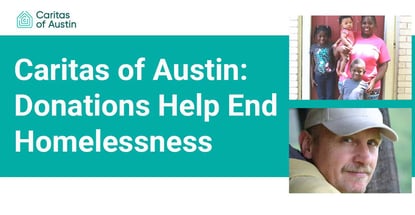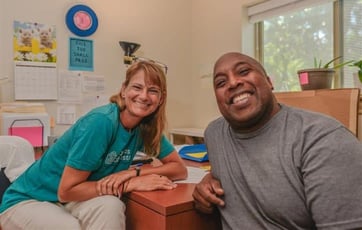
Our experts and industry insiders blog the latest news, studies and current events from inside the credit card industry. Our articles follow strict editorial guidelines.
In a Nutshell: The high cost of living and lack of affordable housing in Austin, Texas, have caused an increase in the city’s homeless population. This influx impacts individuals and cascades throughout an already overburdened local infrastructure. Caritas of Austin is a team of experts dedicated to preventing and ending homelessness in Greater Austin through a housing-first approach that relies on intensive support services. Card donations add resources to a nonprofit that believes in the inherent dignity of all people and builds on that to make Austin a more welcoming place for all.
A stable home changes everything. In Austin, Texas, as in so many American cities, a combination of factors contributes to growing numbers of people experiencing homelessness.
Some homeless individuals in Austin, including people with ongoing substance abuse problems, are chronically unhoused community members. Others are relative newcomers to the area, including refugees attracted by opportunity but who can’t afford Austin’s rising cost of living and rent rates way above market value.
In a few generations, Austin has grown from a college town somewhat off the beaten path to one of the largest cities in Texas and the nation, and its infrastructure and services are straining to keep up. The city exists in a low-tax, low-wage environment that doesn’t leave struggling individuals and households much wiggle room to cope with sudden financial fluctuations.

Caritas of Austin is a nonprofit committed to alleviating homelessness in Austin by getting homeless residents into housing (or back into housing) and providing them with the comprehensive professional support services they need to reintegrate into the community.
Clients receive interdisciplinary professional services to assist and support them as they transition and reintegrate into more permanent housing. Megan Podowski, Director of Grants and Contract Compliance at Caritas, said case managers and specialists work together to tailor a comprehensive response plan according to individual needs.
Caritas of Austin provides rapid rehousing or a permanent supportive environment as needed. Ideally, clients are off the streets in 90 days or less and can support themselves when they exit the program. Less than 20% of rapid rehousing and 10% of permanent supportive housing clients return to homelessness. Card rewards and other financial donations give Caritas the flexibility to continue to meet people’s needs.
“We all benefit when we have a diverse neighborhood and community,” Podowski said. “When people get the chance, they reintegrate back to healthier patterns pretty seamlessly.”
A Housing-First Approach With Comprehensive Support
Since 1964, Caritas of Austin has focused on ensuring people have a stable place to call home. Richard McCabe, a Catholic Monsignor, founded the organization free of religious affiliation. It has attracted the generous support of all faith groups since its inception.
Donors support a nonprofit recognizing that ending homelessness is a unique and complex challenge that starts with each person experiencing it.
But Caritas’ mission has changed as homelessness has changed in Austin, as it has elsewhere. Initially, the organization offered one-time assistance services that frequently took the form of eviction prevention.

But as homelessness took on a more chronic state in Austin in the wake of the Great Recession in the late 2000s, it was time for a more direct approach. Instead of facilitating a revolving door of people accessing the same services, Caritas shifted to a housing-first model with a coordinated entry approach targeting the most vulnerable.
Caritas prioritizes housing as fundamental to stable community integration. It seeks to house people in accommodations located throughout the community, not in walled-off spaces. And the organization respects its clients dignity and privacy as individuals. A refugee support service program offers employment and education services through the Texas Office for Refugees.
“A more recent adaptation is that our screening has incorporated more of an equity lens,” Podowski said. “We’re continuing to prioritize the most vulnerable but also making sure we prioritize individuals with a long history in Austin who have been pushed out to the city’s outskirts.”
Housing first does not mean housing and then you’re on your own. Housing is the initial objective but always comes with intensive wraparound services.
“We’ve got peer support specialists, housing specialists, healthcare navigators, a supported employment team, and an education team,” Podowski said. “Because every case looks a bit different, we want to be adaptive to what each household needs.”
Individual Donations Increase Service Flexibility
About three-quarters of Caritas’ funding originates from various federal, state, and county contracts. Government funds provide sustainability and cover the big costs, but the terms are restrictive. Podowski said she has to remind herself that public administrators are usually not the type of people who access or deliver homelessness services.
“We’ll get contracts that say, yes, we’ll pay for the rent and the utilities, but we’re not going to pay for the mattress or the bed or the sheets,” she said. “When you’re transitioning someone out of homelessness, you want to get them to a place of thriving and identifying the space as their home. Putting them into a unit without a mattress is not that.”

On the other hand, funds generated through philanthropic campaigns and individual donors don’t carry the restrictions of government contracts and allow Caritas far more flexibility to individualize its approach and provide more comprehensive services.
Caritas offers multiple donation options and enables donors to target funds toward specific giving missions. In addition, the organization provides copious volunteer opportunities for at-home, on-premise, and direct client work. A wish list helps Caritas keep essential items in stock.
These options enable a mix-and-match approach that efficiently allocates resources. Volunteerism is a crucial component of success at Caritas, but volunteers can’t fill the demand for experienced professional staff to deliver administrative, case management, and specialized services as needed.
Caritas competes on the open market for those services like any organization. Given Austin’s high-energy economic environment, retaining skilled and dedicated staff requires a significant financial investment.
“We have one of the lowest employment rates in the nation, so staffing can be quite an issue,” Podowski said.
Battling the High Cost of Living to Put People in Homes
In theory, Austin’s high-energy environment provides plenty of employment opportunities for people on the cusp of homelessness. Indeed, Caritas partners with local employers to offer clients jobs through a supported employment program and a built-out network of job leads and providers.
The problem is people can’t earn enough to afford the high cost of living, including rents that far outstrip standard market value, Podowski said. Section Eight HUD subsidies for rapid rehousing help, but there isn’t enough money to fill the gaps.
Supplemental Security Income for disability amounts to about $800 monthly for most recipients, which is not enough to make a dent in everyday expenses. And although Austin mandates a $15 minimum wage, enforcement lags in a state that far prefers the federal minimum of $7.25.

It’s a perfect storm of financial dysfunction contributing to Austin’s rising homelessness. Meanwhile, the more long-standing population of chronically homeless individuals in Austin continues to need and receive attention at Caritas. On top of it all, the city recently criminalized homelessness, pushing people into more precarious situations. People with criminal records have less chance of signing a lease.
Caritas also operates a youth program that works collaboratively with local providers. Individuals who have aged out of the foster care system in Texas are eligible for a full-ride scholarship to a state school. Caritas can provide employment and services for mental health, life skills, education, and social support. Veterans assistance is also available.
Caritas judges performance in terms of the goals clients set for themselves within a framework where housing is paramount. Outreach personnel go to great lengths to locate referral clients and connect them with services. Any way you measure it, Caritas helps most clients transform themselves into productive community participants with a stake in community well-being.
With Espero Rutland, Caritas is moving into facility ownership and management. Scheduled for completion in 2023, the North Austin apartment community will accommodate 171 units and provide structured client support.
“The neighborhood is excited to have us there,” Podowski said. “We feel Espero Rutland will propel us into new projects and opportunities for families and seniors.”


![How to Build Business Credit: 7 Expert Tips to Build Credit Fast ([updated_month_year]) How to Build Business Credit: 7 Expert Tips to Build Credit Fast ([updated_month_year])](https://www.cardrates.com/images/uploads/2017/02/how-to-build-business-credit1.png?width=158&height=120&fit=crop)
![3 Credit Cards For Kids & Ways to Help Them Build Credit ([updated_month_year]) 3 Credit Cards For Kids & Ways to Help Them Build Credit ([updated_month_year])](https://www.cardrates.com/images/uploads/2022/03/Credit-Cards-For-Kids.jpg?width=158&height=120&fit=crop)
![9 Expert Solutions: Build Credit Without a Credit Card ([updated_month_year]) 9 Expert Solutions: Build Credit Without a Credit Card ([updated_month_year])](https://www.cardrates.com/images/uploads/2018/05/without2.png?width=158&height=120&fit=crop)



![5 Best Secured Credit Cards to Build Credit ([updated_month_year]) 5 Best Secured Credit Cards to Build Credit ([updated_month_year])](https://www.cardrates.com/images/uploads/2022/07/Best-Secured-Credit-Cards-to-Build-Credit.png?width=158&height=120&fit=crop)
